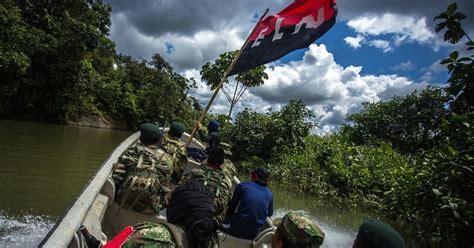
Colombian rebels have reopened their war on the oil industry with a wave of pipeline attacks.
The world’s oldest guerrilla force, known as the National Liberation Army, or ELN, is reactivating its six-decade campaign of sabotage after peace talks with the government broke down, raising the stakes for Colombian President Gustavo Petro by hitting the sector that produces a third of the nation’s exports. The leftist group also renewed hostilities with government security forces.
Producers had been pumping crude oil relatively unhindered while guerrilla leaders met negotiators, seeking a deal that would see the group lay down its arms in exchange for legal and constitutional reforms to provide more support for the poorest citizens. The latest attacks show that the ELN still has the oil industry in its sights and is nowhere near to ending its war.
The group is trying to establish that Colombia should have sovereignty over its natural resources, rather than selling rights to private companies, according to Carlos Velandia, a former senior commander in the group who left in 2004.
“…Oil companies have been able to get contracts that are very advantageous for themselves, but bad for the country,” said Velandia.
Colombia’s state-controlled oil company, Ecopetrol, which owns the pipelines, said Sept. 4 that the attacks, along with the truckers’ strike and protests at a natural gas plant, have seriously affected its operations. The company hasn’t provided an estimate of how much production has been curtailed since the attacks restarted.
As of Friday, the Caño Limon-Coveñas pipeline was still damaged, while the Bicentenario pipeline was functioning again. After placing explosives, the ELN often deploys mines and snipers to make it harder for the army and repair teams to enter the area.
Most of the recent attacks took place in Arauca province, the ELN’s biggest stronghold. The two pipelines connect Arauca, which produces about 58,000 barrels of crude per day — or 7% of the nation’s output — with refineries and a Caribbean port. Canada’s Parex Resources and SierraCol Energy, a subsidiary of the Carlyle Group, operate in the region.
Petro took office in 2022 pledging to seek “total peace” through talks with the guerrillas, but so far the various negotiations have had limited success.
Negotiations with the ELN broke down in May over issues including the government’s refusal to remove the rebels from a list of organized crime organizations. But the group stuck to its cease-fire until it expired in August as efforts were made to get the talks back on track.
Petro is himself a former leftist guerrilla. But the ELN, which was inspired by the communist revolution in Cuba, says Colombia’s oligarchy is blocking his attempts to reform the nation’s conservative economic model.
ELN Taxation at Work
Electricity company Grupo Energía Bogotá, the fourth-most valuable business on Colombia’s stock exchange, recently ran into the ELN when it studied building a power line to connect Arauca with the national grid.
Taxation by the ELN have made Arauca among the most expensive places in Colombia to do business.
“When we looked at how much it would cost to get people to build the towers, to transport the materials, everybody began to charge 45% more” than in other regions of the country.
The ELN sets fire to trucks and buses operating in its territory without its permission. Even if big companies don’t make payments to the group, their subcontractors have little choice, pushing up the price of everything from transport to security services.